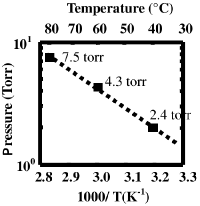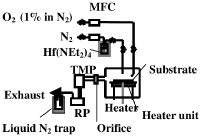Hafnium oxide deposition (CVD): Difference between revisions
No edit summary |
|||
| Line 19: | Line 19: | ||
[[File:HFO2_CVD_setup.png|200px|right|thumb|CVD setup]] | [[File:HFO2_CVD_setup.png|200px|right|thumb|CVD setup]] | ||
Have O<sub>2</sub> in N<sub>2</sub> in a ration 1:99 | Have O<sub>2</sub> in N<sub>2</sub> in a ration 1:99 and feed it into the chamber through a separate nozzle, because otherwise the O<sub>2</sub> decomposes the TDEAH before it can reach the substrate. | ||
Revision as of 19:35, 13 October 2022
The equipment required for this process are a CVD and a plasma cleaner for removing impurities after the Hafnium oxide deposition
Since HfCl4 is a solid salt at room temperature, we need to first create a liquid precursor, and use direct liquid injection for using it in our CVD.
The process is based on a Japanese paper and requires a complex precursor.
The synthesis of the Hf precursor TDEAH (Hf(NEt2)4) is so complex, that it needs its own page.
Precursor injection

Introduce TDEAH gas into the deposition chamber using a bubbling system, use N2 as the carrier gas.
To prevent liquefaction of the source before it enters the deposition chamber, maintain the line from the bubbler to the chamber at a temperature of 85°C.
Oxidizer injection

Have O2 in N2 in a ration 1:99 and feed it into the chamber through a separate nozzle, because otherwise the O2 decomposes the TDEAH before it can reach the substrate.